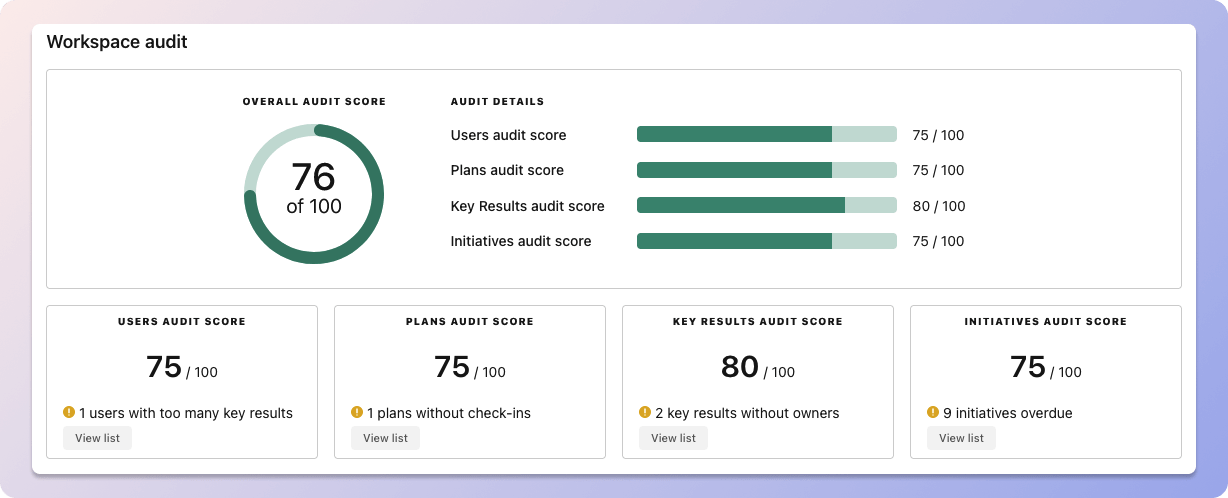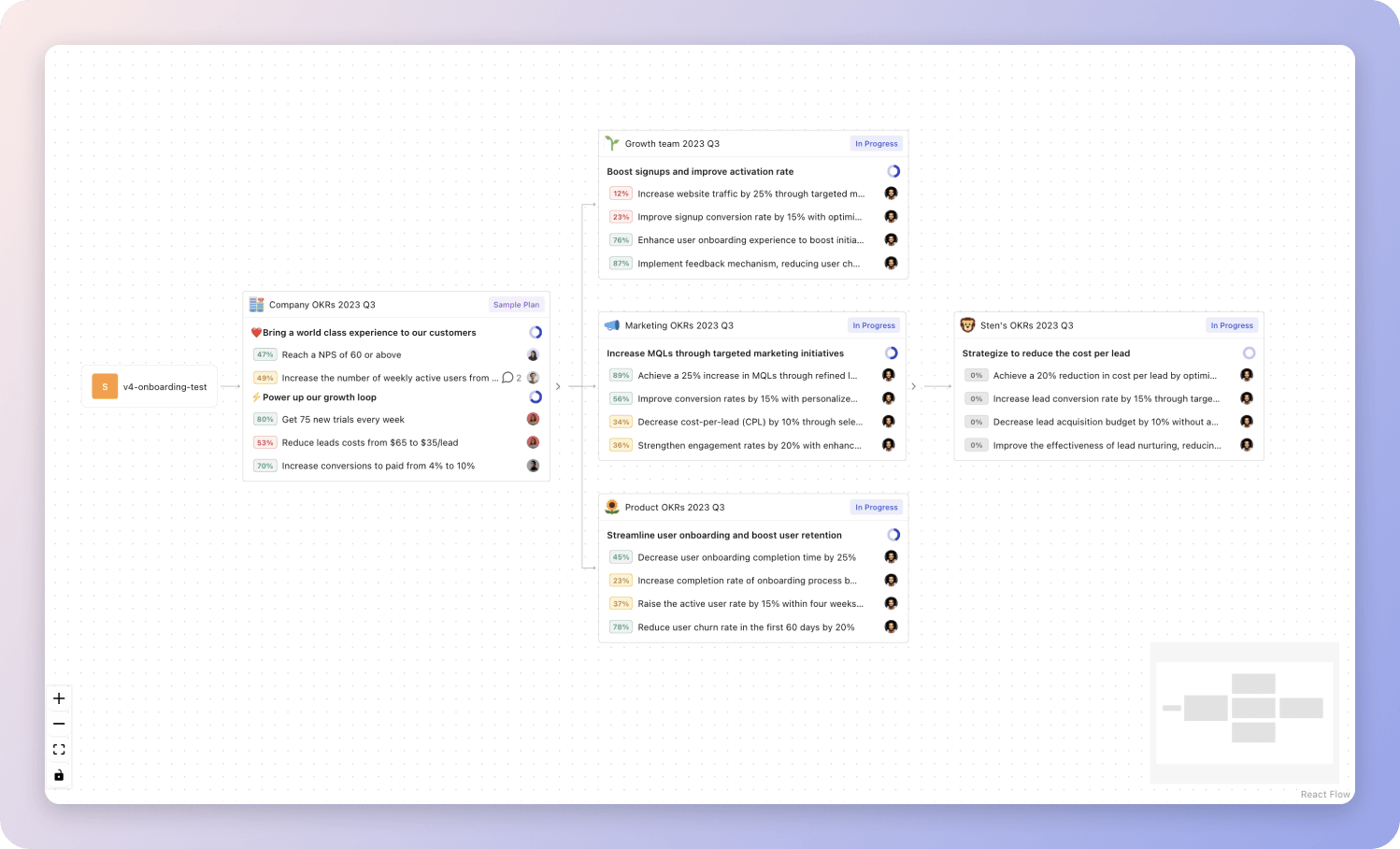2 OKR examples for Workshop Coordinator
What are Workshop Coordinator OKRs?
The Objective and Key Results (OKR) framework is a simple goal-setting methodology that was introduced at Intel by Andy Grove in the 70s. It became popular after John Doerr introduced it to Google in the 90s, and it's now used by teams of all sizes to set and track ambitious goals at scale.
How you write your OKRs can make a huge difference on the impact that your team will have at the end of the quarter. But, it's not always easy to write a quarterly plan that focuses on outcomes instead of projects.
We have curated a selection of OKR examples specifically for Workshop Coordinator to assist you. Feel free to explore the templates below for inspiration in setting your own goals.
If you want to learn more about the framework, you can read more about the OKR meaning online.
Best practices for managing your Workshop Coordinator OKRs
Generally speaking, your objectives should be ambitious yet achievable, and your key results should be measurable and time-bound (using the SMART framework can be helpful). It is also recommended to list strategic initiatives under your key results, as it'll help you avoid the common mistake of listing projects in your KRs.
Here are a couple of best practices extracted from our OKR implementation guide 👇
Tip #1: Limit the number of key results
Having too many OKRs is the #1 mistake that teams make when adopting the framework. The problem with tracking too many competing goals is that it will be hard for your team to know what really matters.
We recommend having 3-4 objectives, and 3-4 key results per objective. A platform like Tability can run audits on your data to help you identify the plans that have too many goals.
 Tability's audit dashboard will highlight opportunities to improve OKRs
Tability's audit dashboard will highlight opportunities to improve OKRsTip #2: Commit to the weekly check-ins
Setting good goals can be challenging, but without regular check-ins, your team will struggle to make progress. We recommend that you track your OKRs weekly to get the full benefits from the framework.
Being able to see trends for your key results will also keep yourself honest.
 Tability's check-ins will save you hours and increase transparency
Tability's check-ins will save you hours and increase transparencyTip #3: No more than 2 yellow statuses in a row
Yes, this is another tip for goal-tracking instead of goal-setting (but you'll get plenty of OKR examples below). But, once you have your goals defined, it will be your ability to keep the right sense of urgency that will make the difference.
As a rule of thumb, it's best to avoid having more than 2 yellow/at risk statuses in a row.
Make a call on the 3rd update. You should be either back on track, or off track. This sounds harsh but it's the best way to signal risks early enough to fix things.
Building your own Workshop Coordinator OKRs with AI
While we have some examples below, it's likely that you'll have specific scenarios that aren't covered here. There are 2 options available to you.
- Use our free OKRs generator
- Use Tability, a complete platform to set and track OKRs and initiatives
- including a GPT-4 powered goal generator
Best way to track your Workshop Coordinator OKRs
OKRs without regular progress updates are just KPIs. You'll need to update progress on your OKRs every week to get the full benefits from the framework. Reviewing progress periodically has several advantages:
- It brings the goals back to the top of the mind
- It will highlight poorly set OKRs
- It will surface execution risks
- It improves transparency and accountability
Most teams should start with a spreadsheet if they're using OKRs for the first time. Then, once you get comfortable you can graduate to a proper OKRs-tracking tool.
 Tability's Strategy Map makes it easy to see all your org's OKRs
Tability's Strategy Map makes it easy to see all your org's OKRsIf you're not yet set on a tool, you can check out the 5 best OKR tracking templates guide to find the best way to monitor progress during the quarter.
Workshop Coordinator OKRs templates
We've covered most of the things that you need to know about setting good OKRs and tracking them effectively. It's now time to give you a series of templates that you can use for inspiration!
We've added many examples of Workshop Coordinator Objectives and Key Results, but we did not stop there. Understanding the difference between OKRs and projects is important, so we also added examples of strategic initiatives that relate to the OKRs.
Hope you'll find this helpful!
OKRs to enhance communication and foster collaboration within the team
Enhance communication and foster collaboration within the team
Conduct bi-weekly workshops to improve team communication skills
Identify key communication issues impacting team's performance
Plan interactive bi-weekly workshops to address these issues
Regularly evaluate workshop's efficiency and adapt accordingly
Implement a successful team project involving all members showcasing effective collaboration
Schedule regular team meetings for progress updates and brainstorming
Actively promote open communication and constructive feedback within the team
Identify individual strengths and assign respective team roles accordingly
Decrease email response time to under one hour during working days
Prioritize regularly checking emails during work hours
Set alarm reminders to answer pending emails
Use quick-reply templates for frequently asked questions
OKRs to enhance synergy between startup house and startup ecosystem
Enhance synergy between startup house and startup ecosystem
Expand network with 15 new startup ecosystem partners by end of next quarter
Reach out with partnership proposals to potential partners
Identify potential startup ecosystem partners for collaboration
Follow up regularly and establish formal partnerships
Develop and organize 4 collaborative innovation workshops for startup house members
Coordinate logistics, including location, materials, and guest speakers
Determine workshop topics and objectives tailored to startup house members
Create and distribute workshop schedules, invitations and promotional materials
Facilitate 3 successful partnerships between startup house members and ecosystem players
Identify potential partners within startup house members and ecosystem players
Organize introductory meetings between identified parties
Support negotiations to formalize partnership agreements
More Workshop Coordinator OKR templates
We have more templates to help you draft your team goals and OKRs.
OKRs to improve our email Marketing activities
OKRs to raise Customer Score and Customer Engagement Rate
OKRs to increase client satisfaction for better retention rate
OKRs to improve time management and task prioritization
OKRs to boost Used Car Sales
OKRs to enhance app personalization and customization
OKRs resources
Here are a list of resources to help you adopt the Objectives and Key Results framework.
- To learn: Complete 2024 OKR cheat sheet
- Blog posts: ODT Blog
- Success metrics: KPIs examples